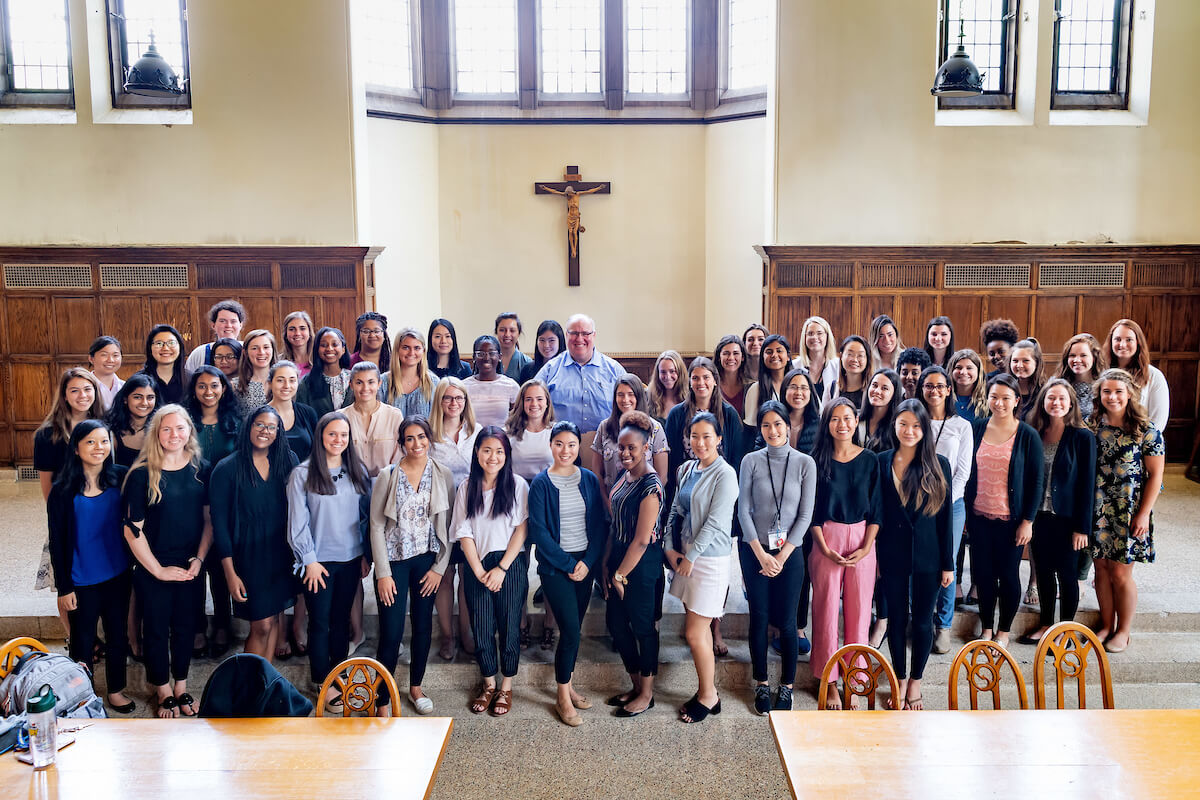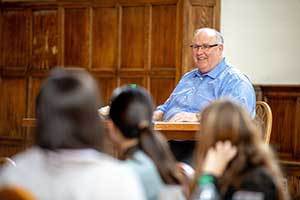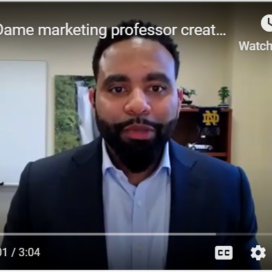Notre Dame, Girls Who Invest partner to advance women in finance
Published: July 17, 2018 / Author: Erin Blasko
The University of Notre Dame Institute for Global Investing, as part of its Women in Finance Initiative, is partnering with the educational nonprofit Girls Who Invest (GWI) to address the gender imbalance in the male-dominated asset management sector.
The University recently welcomed 50 undergraduate women, including five Notre Dame women, to campus for an intensive investment management program focused on education, industry outreach, accessibility and career placement.
In addition to daily classes, lectures and working sessions, the women visited McDonald’s corporate headquarters in Chicago and, as a capstone project, formed teams and recommended to buy or sell McDonald’s stock to a simulated “investment committee.”
The women will spend the rest of the summer working paid internships at one of dozens of leading asset management firms, such as The Carlyle Group, Global Atlantic, AllianceBernstein and Farallon, that partner with Girls Who Invest.
“We are trying to increase the number of women in asset management. And by asset management, I mean actually managing money — not investment banking, general finance or commercial banking,” said Janet Cowell, CEO of Girls Who Invest.
In addition to gender diversity, Girls Who Invest promotes social, racial and ethnic diversity, Cowell said. About 20 percent of this year’s class are historically underrepresented minorities, she said. One quarter of the women come from economically disadvantaged backgrounds.
“There is no cost to the program,” Cowell added, saying, “we don’t want (money) to be a barrier” to participation.
Based in New York, Girls Who Invest seeks to inspire and support young women to become tomorrow’s leading investors through a summer intensive program for rising juniors and online learning programs for rising sophomores and rising juniors.

The summer intensive program, which combines four weeks of classroom work with six weeks of workplace experience, started with 30 women at the University of Pennsylvania in 2016. It expanded to 60 women at Penn in 2017 and 100 women this year — 50 at Penn and 50 at Notre Dame.
The goal: Build a pipeline of female asset managers so that 30 percent of global investable capital is managed by women by 2030.
“The GWI program is one of the programs that the institute is implementing to make more female students aware of the careers in investment management,” Mary Scott, associate director of the Notre Dame Institute for Global Investing (NDIGI), said of the program. “As we broaden awareness of how intellectually stimulating and rewarding these types of careers can be, our hope is that more females will be interested in pursuing this industry.”
A confluence of factors led to the partnership here, Cowell and Scott said. NDIGI was looking for ways to support its Women in Finance Initiative, which works to promote the advancement of women in the investment industry. GWI, meanwhile, wanted to reach more women across the United States.
Sensing an opportunity and knowing that the industry had a need for greater diversity, Kevin Burke, managing director of NDIGI, invited Kathleen Dunlap, then CEO of GWI, to visit Notre Dame last summer and meet with Faculty Director Shane Corwin, finance professor Carl Ackermann and Roger Huang, then the Martin J. Gillen Dean of the Mendoza College of Business.
The visit went well.
“She was impressed with Notre Dame’s faculty and students, and also our classroom and residential facilities,” Scott said of Dunlap, who retired as CEO earlier this year. “Her time on campus allowed her to visualize how this program could be implemented here at ND and how we could be the host for their second site — increasing the number of students GWI serves through their summer intensive program to 100. Kathleen was thrilled that Carl Ackermann would serve as the lead faculty instructor — especially given that he regularly wins awards for excellence in teaching the sophomore-level introductory finance course. She was also excited to learn that we were planning to have many of our female faculty teach during the program, as these women are exceptional role models for the scholars.”
Currently, women and minorities manage just 1.1 percent of the U.S. asset management industry’s $71 trillion in assets, according to a 2017 study by Josh Lerner of Harvard Business School and Bella Research Group.
This is despite ample evidence that diversity of thought in investment leads to better decision making and better returns — and despite serious and widespread efforts to cultivate and recruit more women from within the asset management industry itself.
“Increasing the percent of women will help teams ensure that they have diversity of thought,” Scott said. “When deciding whether or not to proceed with a particular investment, these teams will be better equipped to think about each opportunity from many different angles. If everyone in the room is the same gender and shares similar educations, backgrounds and life experiences, it can be difficult to fully think through the various opportunities and decisions. Diversified teams leads to enhanced company profitability and better investment performance.”
Unfortunately, the pipeline of young female investors is small — partly because women are less aware that a career in asset management can be meaningful and impactful, and partly because of lingering distrust around the industry from the 2008 financial crisis.
At the same time, Cowell said, unlike young men, young women are often discouraged from studying math or other finance-related subjects.
“I experienced this myself when I was in middle school. I had a math teacher who told all the girls that we had instinct as opposed to rationality,” said Cowell, a former state treasurer from North Carolina.
“Women have often been steered away from careers in finance,” Cowell said. “And even if they go into finance, many times women are diverted into roles like human resources, marketing or other ancillary functions.”
A total of nine Notre Dame women were selected for this year’s program — five here and four at Penn. Two Notre Dame women were selected last year. The program is open to all rising juniors, regardless of major.
For the women who participated here — including Amanda Wall (economics and finance) and Julia Reyes (economics and ACMS) — it was an opportunity to learn from faculty and industry professionals and network with other undergraduate women from across the country.
 Notre Dame Vice President and CIO Scott Malpass
Notre Dame Vice President and CIO Scott Malpass
“It’s been great,” said Wall, a Seattle native, pointing to the Brown Bag Lunch Series — a series of lunchtime conversations with men and women from across the investment industry, including Notre Dame Vice President and CIO Scott Malpass — as a particular highlight. “I especially appreciated the sheer variety of practitioners across all asset classes that came and discussed their career paths.”
Reyes, a non-finance major from Cleveland who is still considering her career options, said, “It’s been a really good first exposure (to finance) because it’s so extensive.”
At the same time, Reyes said, because there are mostly women in the room during the various classes and talks — and only women outside of the classroom, in the dorms — it allows for more candid conversations around the challenges women face in the typically gendered space of finance.
The intensive nature of the program — a typical day for the women begins at 8 in the morning and ends at 8 at night — also helps prepare the women for the rigors of the job, which, for those who move directly from college into the job market, typically starts with a demanding stint on Wall Street.
“It is important to broaden the students’ awareness of the various career paths to help them understand the magnitude of opportunities beyond investment banking,” Scott said. “Ultimately, we hope that all our students build on the skills they learn in the classroom and in their first destination jobs to find their area of interest. We regularly talk to the students about their careers being a marathon, with many pivots, twists and turns. It is not a sprint.”
If so, consider this the starting line.
“Girls Who Invest’s approach is focused on increasing the pipeline of young women going into the industry,” Cowell said. “We start with young women — freshmen and sophomores in college — expose them to the industry, educate them, connect them with internships and provide a community of ongoing support.”
For more information, visit www.girlswhoinvest.org.
Nine Notre Dame women were selected to participate in this year’s Girls Who Invest Summer Intensive Program — five at the University of Notre Dame and four at the University of Pennsylvania. All are rising juniors.
Notre Dame
• Amanda Wall (finance and economics).
• Emma Lowry (finance and applied and computational mathematics and statistics).
• Clare Eilers (finance and psychology).
• Julia Reyes (economics and applied and computational mathematics and statistics).
• Kateri Budo (economics and math).
Penn
• Maria Anthony (finance and Spanish).
• Carson Collins (finance and history).
• Melissa Guo (finance and political science).
• Mary Lynch (finance and applied and computational mathematics and statistics).
Originally published by at news.nd.edu on July 17, 2018.
Related Stories




